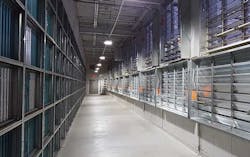Facing Climate Urgency, Facebook Plans to Be Water Positive by 2030
In response to growing concerns about climate change and water scarcity, Facebook says it intends to be water positive by 2030, meaning it will return more water to the environment than it consumes in its global operations. The announcement follows the unveiling of major water conservation projects to support a new data center near Phoenix, which raised concerns that the facility could tax the region’s water resources during a drought.
“The climate crisis demands urgent action from all of us,” Facebook said in a blog post. “Reaching this ambitious goal will require a combination of water restoration efforts starting in
regions that are highly water stressed, as well as technologies to increase water efficiency at our facilities.”
The announcement will have minimal impact on how the company operates its data centers, as Facebook already uses fresh air to keep servers cool, reducing the need for chiller systems or water towers that use large amounts of water.
The biggest impact will be outside the Facebook campuses, in the communities around the company’s data centers and offices. Facebook said it has already invested in water restoration projects in New Mexico, Arizona, Texas, Utah, Oregon, and California that will replenish more than 850 million gallons of water per year.
Water Scarcity Threatens the Southwest
“These water restoration projects offer significant benefits both to local communities and their surrounding ecosystems, particularly in water stressed regions,” the company said. “We partnered with trusted, local environmental non-profits and utility providers to identify projects that would have the greatest impact. In the coming years we plan to expand this work internationally, including in Ireland, Singapore, India, UK, and Mexico.”
The data center project that Facebook announced last week in Mesa, Arizona drew national attention when a Mesa council member expressed concerns about reports that the data center might use as much 1 million gallons of water a day, calling it “an irresponsible use of our water.” To address those concerns, Facebook outlined three water restoration projects that will restore more than 200 million gallons of water per year in the Colorado River and Salt River basins and help provide greater water security for Arizona.
In Arizona, 83 percent of the state is currently facing “severe drought” conditions, according to the U.S. Drought Monitor. On Monday, the federal government declared a water shortage for Lake Mead, the primary sources of water for much of Arizona and Nevada, triggering restrictions on the use of water by farmers and residents. The cuts will reduce use of Lake Mead water by 8 percent for Arizona, with the brunt of the impact to be felt by farmers who must either find other water sources or cut back their production.
The cuts will lower Nevada’s water draw from the Colorado River basin by 7 percent. Meanwhile, California Gov. Gavin Newsom said Wednesday that the state may soon face mandatory water restrictions as the state endures its third straight year of drought conditions.
Designing Data Centers for Low Water Impact
Facebook said it will continue to find ways to reduce its water usage by using onsite recycled water systems at offices. and “working to develop new technologies and operational efficiencies
to make our data centers even more water efficient.”
Fresh air passes through dampened cooling media inside a Facebook data center in North Carolina. (Photo: Rich Miller)
In most of its data centers, Facebook uses direct cooling, bringing filtered outside air into the data hall and circulating it through racks to remove the heat generated by servers and storage units. In its current implementation, fresh air enters Facebook data centers through louvers, and then is filtered and is cooled by passing through media that has small amounts of water flowing through it. Facebook says this process uses 60 percent water than traditional cooling.
Facebook has also begun using StatePoint liquid cooling system (SPLC), which was developed in partnership with cooling specialist Nortek and uses membrane energy exchanges, a new approach to evaporative cooling. SPLC uses a liquid-to-air energy exchanger, in which water is cooled as it evaporates through a membrane separation layer. This cold water is then used to cool the air inside the data center.
“We continue to use direct evaporative cooling with outside air to cool our data centers,” said Facebook spokesperson Melanie Roe. “As for SPLC, it is currently being implemented at our data center in Ireland and we anticipate it will be operational at the beginning of next year. We have not implemented it at U.S. locations since direct cooling works at these locations and uses less water than SPLC.”
Facebook continues a massive global expansion of its infrastructure. Over the past year, it has announced new data centers in Illinois and Tennessee, as well as major expansions of existing campuses in Utah, Georgia and Prineville, Oregon, where the company is rolling out a multi-story data center design featuring two floors of server rooms to boost capacity.
About the Author




